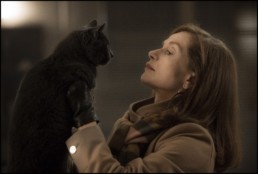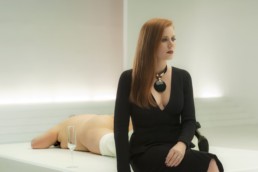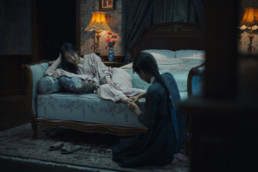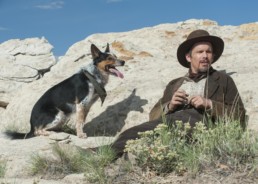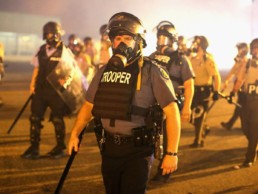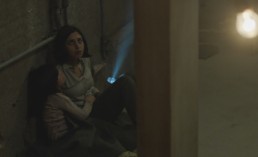'Elle' Review: The Unconventional Aftermath of Assault
This film was reviewed on November 18th as first seen at this year's AFI FEST presented by Audi
Given the outcome of our current political climate, it's been made evident that women nationwide are searching for a strong female role model: A woman who is both confident and nurturing, respectable and responsible. While looking to politics might not be the answer right now, Paul Verhoeven's latest film, 'Elle,' is divisive enough that it can either be that source of female empowerment for those who chant "My body, my choice," or likely irritate the alt-feminist. With a powerhouse performance from the legendary Isabelle Huppert, 'Elle' is an uncomfortable watch at times, but the result is nonetheless a provocative and emotionally-charged drama.
'Elle,' which translates to "she" in French, tells the story of Michèle Leblanc (Huppert), a middle-aged divorceé who finds herself the victim of a brutal rape, in her own home nonetheless. She has her reasons for not going to the police (which is uncovered later) and does her best to put it behind her. She keeps her composure at work where she oversees the production of a borderline pornographic medieval fantasy video game. However, little triggers like the sound of her cat's meow initiate violent flashbacks, which make it impossible for her to forget that night. What's worse, Michèle's attacker is stalking her, breaking into her home and leaving behind traces of his presence. The mind games finally become too much for her and the ruthless attitude she has held all along becomes jeopardized as she willingly and subconsciously gives into her attacker's sadistic ways.
What's so fascinating about this film is that our protagonist is a victim of rape, yet uses her situation as both empowering victimizing, simultaneously. This is not a black and white film in regards to Michèle's response to her attack – in fact, I'm sure there will be people who had the same reaction I did – one of, "Why is she doing that!?" It's a fact that Michèle and I would respond to in very different ways, especially once a disturbing childhood event may make sense of things. 'Elle' shouldn't be criticized for its offering of brutal honesty and insight into the emotionally complex feelings of this particular woman.
Director Paul Verhoeven, whose past credits include 'Total Recall,' 'Starship Troopers,' and 'Basic Instinct,' creates one of his most provocative films to date with plot and character twists that make this movie anything but conventional. 'Elle' is an adaptation of Philippe Djian's novel Oh..., and so while the story may not be original, Verhoeven's adept eye creates a visually stunning and layered world. Michèle is such an ambiguous character, our interest in her is always piqued as we wonder what she is going to do next. His ability to retain an audience's attention, especially during particularly grievous moments, is truly mesmerizing.
Despite its heavy thematic content, 'Elle' steers clear from ever being melodramatic or depressing. Humorous, albeit darkly humorous, dialogue is sprinkled throughout the film, giving audiences a much-needed outlet for laughter. After a successful festival run (the Cannes audience gave the film a seven-minute standing ovation), 'Elle' has been selected as France's choice for Best Foreign Language Oscar consideration.
'Elle' is rated R for violence involving sexual assault, disturbing sexual content, some grisly images, brief graphic nudity, and language. 130 minutes. Now playing at ArcLight Hollywood and the Landmark, expanding to additional cities in the coming weeks.
‘Nocturnal Animals’ Review: As Stylish and Seductive as its Director, Tom Ford
For all of its glitz and glamor, Nocturnal Animals is, at its core, an introspective look at love, loss, and loose ends.
Leave it to Tom Ford, world renowned fashion designer (fans include Beyonce, Anne Hathaway, Bradley Cooper, Will Smith, and Julianne Moore to name a few), to create such a visceral and complexly beautiful follow-up to his directorial debut A Single Man with the sexy revenge thriller Nocturnal Animals. Based on the novel Tony and Susan by Austin Wright, Ford proves that he can conquer yet another multi-million dollar industry with the same grace that has earned him an elite status in the fashion world. Using his expertise, Ford's meticulous eye picks up the minutiae of each character, giving the film a full-bodied story that makes it both an edge-of-your-seat thriller and also a breathtakingly gorgeous lookbook.
Upon first glance, Susan Morrow (Amy Adams) seems to have it all: a handsome husband (Armie Hammer), a beautiful modern home in the Hollywood Hills, and a prestigious career as an art gallery owner. However, the look on her face reveals that she is not happy; her handsome husband leaves her in that beautiful home alone most nights as he travels for business and conducts affairs on the side. Her latest gallery installation seems to taunt her with the one thing she wants most: freedom. Unsatisfied with her situation, Susan perks up upon receiving a book manuscript from her ex-husband Edward Sheffield (Jake Gyllenhaal), titled Nocturnal Animals. Although they haven't spoken in over 20 years, the note Edward sends along with the book explains that he wanted Susan to read his novel first, as she was the source of inspiration. As Susan delves deeper into Edward's story of heartbreak and revenge, she is forced to re-confront the dark secrets she had buried away and the consequences of the past she tried to forget.
The intricacy of Nocturnal Animals, which won the Grand Jury Prize at the 2016 Venice International Film Festival, comes into play as Susan begins to read the manuscript. Ford creates a "story within a story" with the novel- creating the world of the book as written by Edward. Jake Gyllenhaal also plays Edward's fictional character Tony Hastings, a married father of one. His wife, who is supposed to represent Susan in spirit, is Laura Hastings, played by Isla Fisher. Their daughter India (Ellie Bamber) completes this secular, fictional family. The scenes that are from the book's POV have a contemporary Western feel- both in its vibrant look (Ford shot on film) and character breakdown; including a malicious sociopath Ray Marcus, a phenomenally brutal performance by Aaron Taylor-Johnson, and the Southern-drawled antihero played by Michael Shannon who balances the comedic and temperamental personality of his character, Officer Bobby Andes, just right. As the film jumps from the past to present to fiction, it finds strength in the depth of all of its characters, which fuels the cyclical motion of this layered story.
It's a well-known fact that silence commands attention, and Tom Ford has mastered this art on screen. Amy Adams exhibits more acting through her detailed movements and expressions than she does through verbal communication. Her performance is kept close to the chest but is fully dramatic and confident nonetheless. Ford seems to find his comfort zone and subsequent directorial voice in this silence; he himself being a rather soft-spoken man. After watching his films, it's evident that they come from a personal place, not literal, per se, but an intimate origin.
For all of its glitz and glamour, Nocturnal Animals is, at its core, an introspective look at love, loss, and loose ends. This isn't the type of film that leaves you restless at night, fearing that a creature is going to interfere with your life in some way. Rather it leaves you wanting more- a fuller resolution, a ghost to pin tension on. Yet again, Tom Ford succeeds in leaving his audience with a topic of conversation to discuss after the film ends. The open ended-ness could perhaps be looked at as questionable screenwriting, but personally, I think it makes for one grand finale of emotional tension.
'Nocturnal Animals' is rated R for violence, menace, graphic nudity, and language. 117 minutes. In select theaters on Friday, November 18th.
'Trash Fire' Review: This Off-Kilter Horror Film is an Acquired Taste
Trash Fire is an acquired taste. It's doubtful that it will become a camp classic, although fans of off-kilter horror films may find this little flick enjoyable.
Too bad Halloween is over, the romantic comedy meets horror film Trash Fire would have been a nice addition to the campy holiday genre. The Adrian Grenier-starring film, which made its world premiere during the Midnight section of the 2016 Sundance Film Festival, doesn't quite live up to its name (and with a name like Trash, that is a good thing), although there is much to be desired in terms of overall cohesiveness and character likeability. Trash Fire may leave you thinking, WTF?– but if you can embrace the absurd then perhaps you can find some desirability here.
Immediately, writer/director Richard Bates Jr. thrusts his audience into the stylized world of a common horror film, complete with that greenish hue and monotone bass synth score. However, what is truly horrifying is witnessing the dysfunctional relationship between Owen (Grenier) and his girlfriend Isabel (Angela Trimbur). Owen is hard to sympathize with at first; his smart-ass attitude is alienating to both his relationships onscreen and the audience's relationship with him. He relentlessly insults Isabel's straight-laced, religious brother, Caleb (Matthew Gray Gubler), calling him a beige earthworm among other things. Just as the audience should give up any hope for Owen's self-reflection, Isabel's unexpected pregnancy forces him to re-examine his own childhood and attempt to make amends with his estranged younger sister, Pearl (AnnaLynne McCord).
The actual "horror"part of Trash Fire comes into play in the second half of the film. Violent flashbacks and seizures plague Owen, who grew up believing that an accidental fire he set killed both of his parents and left Pearl scarred for life. At this point in the film, the Owen we knew in the first act is completely transformed into a caring, selfless boyfriend (a major character overhaul that feels too rushed to be believable). Owen's snarky grandmother Violet (Fionnula Flanagan), whose true colors prove she is an evil woman, rounds out this crazy cast of characters.
While Trash Fire is not the type of film I typically gravitate towards, I give credit to Richard for executing his vision with intention. The color of the film is purposefully not welcoming or warm, perhaps a visual representation of Owen's discomfort with the relationships in his own life. The characters rarely converse together in the same frame, instead, addressing the camera in a medium shot. This direction, while original, feels unorganic– like the film is comprised of multiple "scenes" with a specific start and end point– rather than feeling like a fluid story.
Trash Fire is an acquired taste. It's doubtful that it will become a camp classic, although fans of off-kilter horror films may find this little flick enjoyable. But if this review can be summed up in a single image, look no further that the above picture. Grenier and Trimbur's faces say it all.
'Trash Fire' is rated R for some disturbing violence/behavior, strong sexuality, nudity, and language. 91 minutes. Now playing at the Laemmle Monica Film Center and on VOD.
'The Handmaiden' Is a Web of Lies, Deceit, and Sexual Tension
Often regarded as a Renaissance man of Korean cinema, Park Chan-wook does what all excellent filmmakers strive to do– create a technically engrossing and emotionally compelling story that resonates with its audience far after the credits are finished rolling.
"A story is all about the journey," Uncle Kouzuki says to Count Fujiwara as he cuts off the Count's fingers one by one, taking joy in the other man's pain. The sex-obsessed and domineering Uncle, while deplorable in every way, speaks a ring of truth in his observation of what makes a good story, and in the case of director Park Chan-wook's film The Handmaiden, the 2.5 hour journey we will embark on leads us through a tangled web of sexually-charged tension made even more complicated by the layers of lies and deceit, while remaining a shocking and, at its core, beautiful piece of cinema. Essentially, this is a film where predicting what will happen next is utterly pointless, so it's best to just sit back and let Chan-wook be your guide throughout this multidimensional journey.
The scene is set during the 1930's as a young Korean woman, Sookee (Kim Tae-ri), is chosen to work as a handmaiden to the young Japanese heiress Lady Hideko (Min-hee Kim). The Lady's family have all passed away, leaving her the sole proprietor of the family's fortune. Her first day on the job, Sookee meets the Lady at the beautiful, yet secluded, Korean estate where she lives with her much older Uncle Kouzuki (Jin-woong Jo)- who has made his plans of marrying her to inherit her wealth, clear. Both women are quickly drawn to each other, the lines of friendship become blurred and sexual tension arises, however, it is Sookee that is hiding an ulterior motive that may prove to be detrimental.
Before Sookee was hired as the handmaiden, she made her living as a forgery specialist and a pickpocket master. Seeing an opportunity to leave that life behind for good, Count Fujiwara (Jung-woo Ha) devised a plan to get Sookee close to the Lady, with the intention to convince the heiress to marry him instead of her Uncle. Soon after the Count and the Lady were to marry, he planned to put her in a mental hospital and keep all of her money to himself. He would give Sookee a cut of the wealth, as well as give her all of the Lady's clothes and beautiful garments. In theory, Sookee knows that following through with the plan is her ticket out of her dead-end life, however, after inadvertently growing personally attached to and starting to fall in love with Lady Hideko, she questions everything she thought she knew and wanted.
The Handmaiden is cut into three distinct parts, and what I have just described only takes place in the first act. Needless to say, there is a lot more drama than unfolds in the second and third part. The second act delves deeper into the Lady's childhood growing up alone and her relationship with her twisted uncle, a man who collects pornographic novels and forces his young niece to read them aloud to grown men. While the first act leaves the viewer with one sense of how the film is going to progress, the second act turns that theory on its head. We revisit scenes that occurred in the first act through a new lens in the second and third acts, proving that what you think you know, you really don't.
Park Chan-wook's phenomenal storytelling abilities are on heightened display here. Using the three-part structure to tell the same story through three very distinct characters gives the film a tangible sense of fullness. Scenes that seemed to be abruptly cut off at the height of sexual tension are revisited and followed through in later acts. Park Chan-wook doesn't hold back from getting graphic, but he does so in a way that doesn't feel overly pornographic for shock's sake. The energy he creates from the environment, the characters, and the situations make for one truly unforgettable viewing experience.
All of the performances are effective and wildly entertaining, but it is the debut from actress Kim Tae-ri who plays Sookee that is truly mesmerizing. Tae-ri beat out over 1,500 other actresses for the part and it is to her advantage that she had little to no acting experience prior. Her demeanor can best be likened to Belle's in Beauty and the Beast. Both have an innocence that is only intensified by their large, doe-eyes, but they are self-sufficient and have a backbone when they feel like they're in jeopardy. This may be just a coincidence, but even Sookee's outfit– a blue long-sleeved dress with a white apron– is reminiscent of the Disney princess.
If you were not familiar with Park Chan-wook's impressive filmography before The Handmaiden, (credits include Oldboy and Thirst), then you are in for a mind-blowing experience. Often regarded as a Renaissance man of Korean cinema, Park Chan-wook does what all excellent filmmakers strive to do– create a technically engrossing and emotionally compelling story that resonates with its audience far after the credits are finished rolling. The Handmaiden should serve as an example of masterfully executed cinema from both sides of the camera. Despite The Handmaiden's rather lengthy runtime with both Japanese and Korean subtitles, this is the rare occurrence where I am actually looking forward to rewatching the film again, knowing that when I do, I'll walk away with an even deeper appreciation of Park Chan-wook's unique style.
'The Handmaiden' is not rated. 144 minutes. Now playing at ArcLight Cinemas, The Landmark, Laemmle Theaters, and more.
'In a Valley of Violence' Review: An Old-School Western with Fresh, Distinct Attitude
Self-admittedly, I'm not the biggest horror fan, so my first introduction to director Ti West was at the 2013 AFI Film Festival where his thriller/horror film The Sacrament was shown during the midnight screening series. As the lights came up at the end, I felt rejuvenated– despite it being nearly 2am. There was something about the way this director works a story that kept me on the edge of my seat, from guessing at potential plot twists, to excitedly giddy when the unexpected happens. This same charisma can be felt in West's latest directorial endeavor In a Valley of Violence. A departure from his traditional safe zone of low budget horror, this in no way means that Valley lacks in the obscenely bloody department.
Ethan Hawke plays Paul, a handsome drifter who is wandering through the hot and barren desert towards Mexico with only the clothes on his back and a loyal canine companion protectively at his side, a border collie/blue heeler mix, named Abby (Jumpy). While scouting their next move, Paul discovers a shortcut through the poor and forgotten mining town of Denton, often referred to by outsiders as the "Valley of Violence." Paul quickly learns that Denton lives up to its reputation as he comes across the outspoken and brash Gilly (James Ransone), son of the town's Marshal (John Travolta), as well as his fianceé Ellen (Karen Gillan), and his equally obnoxious associates.
A fist fight between Paul and Gilly in the town's square is just the beginning of a terrible downward spiral for both the men and the town as a whole. Revenge becomes the foremost thing on their minds, and neither one plans to stop until they see the other dead. Boundaries are crossed, relationships are torn apart, and blood spews from every possible direction. However, Paul discovers that not everyone is out to get him. The young and loquacious Mary Anne (Taissa Farmiga), who happens to be Ellen's younger sister, becomes deeply infatuated with Paul's mysterious character and sees him as her ticket out of town.
West does a superb job in paying homage to the classic movies of Western Americana. From the stylized opening credits to the dramatic camera push-ins on characters and even the color grade, he sets an old-school mood with a fresh, distinct attitude. It may be that West attributes some of Valley's style to horror master Quentin Tarantino, specifically The Hateful Eight and Django Unchained. Although, with a runtime of 104 minutes (compared to 167 minutes and 165 minutes, respectively) West's pacing proves to be tighter and more succinct.
Expect to see another solid performance from Hawke, who takes his even-keeled, grungy anti-hero persona and delivers high-intensity action to the scenes that need it most. Not to be upstaged is John Travolta as The Marshal. It was truly a pleasure seeing Travolta in this role; not only did he steal scenes with his spot on comedic timing, it is generally good to see him back on the big screen. And speaking of stealing scenes– I believe Jumpy's performance as Abby the dog is the best we've seen since The Artist. Given the fact that she tucks herself into bed, takes bubble baths and a myriad of other equally impressive tricks. As the only dog cast in the role, she really is the MVP of the film.
All of this to say, Ti West's film, which he also wrote and edited, is a fantastic and original work from the guy previously known as the "horror director." West shows the film industry and fans alike what is possible when stereotypes become broken and one challenges himself creatively. As you get ready to see In a Valley of Violence this weekend (and I recommend you should), be prepared to laugh, shed a few tears, and most importantly, be ready to be entertained.
'In a Valley of Violence' is rated R for violence and language. 104 minutes. Opening at the ArcLight Santa Monica and On Demand & Digital HD Friday, October 21st.
'Do Not Resist' is An Unsettling Exposé of Those Sworn "To Serve and Protect"
On Saturday, October 8th, three Palm Springs police officers were shot after responding to a family disturbance call, a seemingly routine operation that ended up being anything but.
Jose Gilbert "Gil" Vega, 63, a 35-year veteran who was due to retire in December, and Lesley Zerebny, 27, who had just returned from maternity leave after giving birth four months earlier, were both killed as a direct result of their gun-related injuries. As tragic and shocking as this situation is, officer-involved shootings– from both sides of the gun– are no longer isolated incidents, but instead are becoming more commonplace each day. The pervasive question of "how did we get here" is what makes director Craig Atkinson's timely documentary Do Not Resist so compelling as he shines a light on the reality of American policing today, the militarization of the force, and the effect it is having on the communities they are sworn to protect.
Do Not Resist opens on the streets of Ferguson, Missouri during one of the nightly protests following Michael Brown's shooting death in 2014, where tension and emotions are at an all-time high. Atkinson and his camera become a fly on the wall as hundreds roam the streets chanting "No Justice, No Peace" and "Hands Up, Don't Shoot" while police try to control the ever-growing, increasingly hostile crowd. It's these types of scenarios that raise the question of how to ensure the safety of citizens and the officers themselves. Many seem to think that military-grade weapons, armored cars, and other various equipment will make communities a safer place, and since the federal government has given police departments more than $40 billion in military-style equipment since 9/11, access to this weaponry is so much easier.
But who is this benefitting, really? Atkinson attempts to show how citizens disagree with the choice to accept such high-powered weapons for fear that America will become a militarized war zone and in turn, the rights and free will of citizens will come second to an officer's agenda. "More Mayberry, Less Fallujah" one protestor's sign reads. Then there are those who side with law enforcement, claiming that they need these specific weapons, because "at some point, the state has warranted it." And who can blame the officers for assuming the worst in others when they are consistently being trained by those in positions of authority that they are "men and women of violence" and "violence is your weapon." Is it really any surprise then that the first reaction is to turn to military-style protection?
This issue, in general, is a divisive one, and while Do Not Resist does side with those critical of law enforcement's tactics, there is no arguing with the facts and numbers it presents onscreen. We see and hear first-hand accounts of police training seminars admiring the reputation of law enforcement in places like Mexico and Russia and acknowledging the use of city-wide CCTV cameras with software that allows the government to track people and objects. It is all extremely eye-opening and a disturbing reality check of what 21st-century American police culture looks like today.
It can all be boiled down to the age-old question: Which came first, the chicken or the egg? In this case, are extreme policing tactics to blame for the citizen's distrust of cops and subsequent violent behavior? Or is the out of control behavior of citizens the reason for such heightened and extreme police security? Attacks on and by law enforcement, in general, is nothing new, but the rate at which it continues to happen is shocking. In the Los Angeles area alone, there have been a number of fatal police shootings in South L.A., Pasadena, as well as El Cajon, to name a few. However, there are two sides to the story, and director Craig Atkinson gives us a peek into this issue in this Tribeca award-winning documentary.
Directly or indirectly, we find ourselves at a crossroads right now when it comes to trusting the police. New cases of police brutality primarily against black men, some of whom are found to be unarmed and non-threatening, seem to make headlines every other week and only further perpetuate the stereotype of the "crooked cop." Do Not Resist does not attempt to answer the question of how to solve this problem, rather, it forces one to become aware of the situation that is unfolding in our neighborhoods, affecting our family and friends, and tarnishing our nation. Just over an hour-long (any longer would have been incredibly depressing), Do Not Resist should definitely be mandatory viewing.
'Under the Shadow' Review: Exposes a Haunting Fairytale From the Quran
October is the perfect time to revisit those classic thrilling tales that run chills down your spine (for a full list of what is available to stream now, check out our What's Streaming Feature).With Halloween quickly approaching, it is time to look past the traditional werewolves and vampires, and check out the Farsi-language Iranian festival-breakout, Under the Shadow. Marrying politics of the 1980s with timeless horror, writer/director Babak Anvari's feature-length directorial debut is a fresh take on international folklore, where spooks have no bounds.
The film begins with a title card giving historical context to clarify the situation of the characters, who are living in Tehran– the epicenter of the Iran-Iraq War during the 1980's. Our protagonist is Shideh (Narges Rashidi), a wife, mother, and aspiring doctor, who is told she cannot continue her studies due to her previous involvement in political activities. Frustrated and resentful, Shideh finds herself at a crossroads when her husband Iraj (Bobby Naderi), a practicing doctor, is drafted by the army to aid wounded soldiers on the frontlines of battle. She ignores his pleas to take herself and their daughter Dorsa (Avin Manshadi) to find safety out of town and instead opts to stay home alone in their modest apartment.
Strange things begin happening in the complex like an airstrike that hits the apartment, but miraculously the missile fails to explode. Soon, personal possessions begin disappearing; for daughter, Dorsa, it is her favorite doll and for Shideh, her Jane Fonda workout VHS tape. Slowly, the once strong woman, Shideh finds herself transforming into an unstable and fearful girl. Then the hallucinations begin, making it hard to differentiate reality from a nightmare. As Shideh nears brink of insanity, she learns from a superstitious neighbor that this could be the work of Djinn, Middle Eastern spirits that travel with the wind to possess unsuspecting victims. This brings up more questions than answers, but ultimately Shideh knows that she has to face whatever is tormenting her family head on for any chance of survival.
Under the Shadow has a Sixth Sense vibe in the way that it is a psychological slow burn for most of the film, but the last 20 minutes really gets the heart rate pumping. That said, there are early moments of discomfort that fully engage the audience into caring for our protagonist. For example, Shideh choosing to stay in the house alone is the equivalent of the stereotypical scenario of a girl walking home alone through the woods at night, an obviously bad idea! Our stomach is in knots as we foreshadow the events to come, and with credit to director Babak Anvari, the events that do come are unexpected. There are no cheap tricks or forced emotional pulls here, rather, good old-fashioned mind games.
It is no surprise why Under the Shadow has been a festival favorite; not only does it take the horror genre to new heights by introducing Western audiences to Djinn, the haunting fairytale from the Quran, but it also has this refreshing feeling of a genre film done right. Narges Rashidi takes command as Shideh and her performance is powerfully affecting. Not to be out "shadowed" is her 9-year-old co-star Avin Manshadi, who makes her acting debut in this film. Solid performances coupled with an equally powerful script gives Under the Shadow all the necessary ingredients to be a staple in the horror film catalog.
'Under the Shadow' is rated PG-13 for terror, scary images, and brief language. 84 minutes. In theaters at Sundance Sunset Cinema and on VoD tomorrow, October 7th.
Review: 'Danny Says' is a Larger Than Life Look at Rock and Roll Legends
In 1980, The Ramones released their fifth studio album, End of the Century, which included the love ballad Danny Says, a departure from their typical sweaty rock and roll hits. Danny Says went on to become one of the band's more well-known songs and was covered by artists such as the Foo Fighters and Tom Waits. The titular "Danny" in the song, and in director Brendan Toller's documentary of the same name, is Danny Fields– the charismatically flamboyant manager of the Ramones, the self-appointed press agent of The Doors, and an all-around legend in the 1960's music scene.
"Danny Says" follows the career highs and lows of a self-proclaimed homosexual Jewish boy from Queens, NY, who dropped out of Harvard at 19, while pursuing a law degree. Danny had always gone against the grain as a young boy, after catching an impromptu performance of Nina Simone, he fell in love with the energy of live music. From there, he found himself rubbing shoulders with Andy Warhol and Edie Sedwick at the Silver Factory, to feeding drugs to Jim Morrison and signing The Stooges and MC5. Danny's live fast, play hard attitude makes for an incredible story which is made even more powerful with the abundance of archival footage.
Since some of the stories Danny tells don't have an actual video component, director Brendan Toller uses mixed media in the form of cartoons to better explain the narrative. This works so well on two levels; one, the cartoons are stylistically engaging and beautiful works of art even as stand-alone pieces. The second is the fact that these stories are so radically wild, the simpleness of the cartoon lets the audience focus on the story rather than get distracted by the visuals on screen. One story, in particular, is extremely effective with this directorial storytelling. Danny admits that while working at a magazine during the early part of his career, he was the one who put John Lennon's infamous comment about "The Beatles being more popular than Jesus" on the front cover, effectively responsible for the chaos that ensued which included album burning, Ku Klux Klan demonstrations, and radio boycotts all aimed at the most popular band of the times.
For as many interesting stories as Danny and the film tell, it can get a bit frustrating to battle the spotty audio quality. There are times when we are straining to hear past the interviewee's echo, and that can test the attention span. However, one should definitely look past those brief moments for maximum enjoyment. The film is very conversational in nature, similar to the 2013 documentary "Supermensch: The Legend of Shep Gordon," giving the audience the opportunity to see Danny Fields in his true form, up close and personal.
Fans of the short-lived HBO series "Vinyl" will definitely enjoy seeing this real life Richie Finestra retell his stories of drug-infested parties and late night shenanigans with the biggest stars in rock and roll. In the beginning, Fields was just another Silver Factory party boy who thought he had made it big when Nico crashed his house party. To hear and see his evolution to one of the most influential names in rock and roll history is not only an entertaining watch, it is an essential one.
"Danny Says" is not rated. 104 minutes. Opening at Sundance Sunset Cinemas and VOD this Friday, September 30th.

